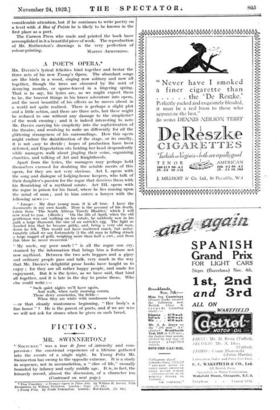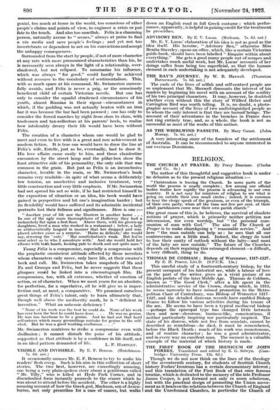FICTION;
MR. SWINNERTONA
" NOCTURNE " was a tour de force of .intensity and com- pression : the emotional experience of a lifetime gathered into the events of a single night. In Young Felix Mr. Swinnerton has swung to the opposite extreme. It is a study in sequence, not in accumulation, a " slice of life," casually bounded by infancy and early middle age. It is, in fact, the leisurely record, almost the discussion, of a character too
(Continued on next page.)
• True Travellers: a Tramp's Opera in Three Ada. fly William H. Davies. With Decorations by William Nicholson. London: Cape. 1 is. 6d.] t roung Petir. By Frank Swbutcrton. London,: Butebin.son. P's. 644
genial, too much at home in the world, too conscious of other people's claims and points of view, to engineer a crisis or put fate to the touch. And also too unselfish. Felix is a charming person, naturally averse to " scenes," always at pains to find a via media and save people's feelings ; and yet not too invertebrate or dependent to act on his convictions and accept the unhappy consequences.
Surrounded from the start by people, if not of more character
at any rate with more pronounced characteristics than his, he
is necessarily seen always in the light of a relationship, over- shadowed, but not eclipsed. To summarize his influence, which was always " for good," could hardly be achieved without recourse to the vocabulary of sentimentalism. This, with so much space at his command, Mr. Swinnerton success- fully avoids, and Felix is never a prig, or the consciously beneficent child of certain Victorian novels. But one has only to consider the squalid straitened, circumstances of his youth, almost Russian in their rigour—circumstances in which, if the pudding was not actually beaten with an iron bar it was because the bar had been pawned ; one has only to consider the forced marches by night from slum to slum, with tradesmen and tax-collectors at his parents' heels, to realize how intolerably dreary their life would have been without Felix.
The creation of a character whom one would be glad to meet and even to live with is a great and rare achievement in modern fiction. It is true one would have to draw the line at Felix's wife, Estelle, just as he, eventually, had to draw it.
His love affairs came easily to him, and those clandestine encounters by the street lamp and the pillar-box show the least attractive side of his personality, the only side that was common in the grain. But just as Felix is an inconclusive character, lovable in the main, so Mr. Swinnerton's book remains very readable—in spite of what seems a deliberately low tension, an unselective and inclusive treatment, very little construction and very little emphasis. If Mr. Swinnerton had not spread his net so wide, if he had restricted himself to the exposition of situation or an idea,- his book would have gained in perspective and hit one's imagination harder ; but its flexibility would have suffered and its admirable incidental 'portraits lost their fullness and significance. Here is one :—
"Another year of life saw the Hunters in another home . . . In one of the ugly main thoroughfares of Holloway they had a melancholy flat upon a first floor. Above them, with his grown-up daughters, lived a man who worked in a restaurant ; below, a lady so aristocratically languid in manner that her dropped and mis- placed aitches came as a surprise. Haim so delicate,' she would say, stressing the cate." Mai constichution's weak. But harm Meg select as to who I assoshiate with.' And she would hold her elbows with bc4ih bands, looking pale to death and not quite sane."' Young Felix is a compromise, especially a compromise with the prophetic omniscient attitude affected by those novelists whose characters only move, only have life, at their creator's
beck and call. Mr. Swinnerton takes snapshots of Ma and Pa and Grumps and Felix, but he never suggests that these glimpses could be linked into a cinematograph film. He compromises, We, with all extremes, whether of emotion of action, or of character. When we most yearn for an absolute, for perfection, for a superlative, all he will give us is imper- fection and, at most, a comparative. We promised ourselves great things of Felix's talent, only to learn ultimately that, though well above the mediocrity mark, he is " deficient in invention." What an unheroic deficiency !
" None of his work was the best he could do. None of his work has ever been the best he could have done.. . . He was no genius. He was too facetious to be a genius. And he had not that hard self-esteem which many groundhogs mistake for genius in the self- elect. But he was a good working craftsman. . . ."
Mr. Swinnerton contrives to strike a compromise even with disillusion ; it cannot disturb the poise of his attitude, supported as that attitude is by a confidence in life itself, not
in an ideal pattern demanded of life. L. P. ITARTLEY.



















































 Previous page
Previous page